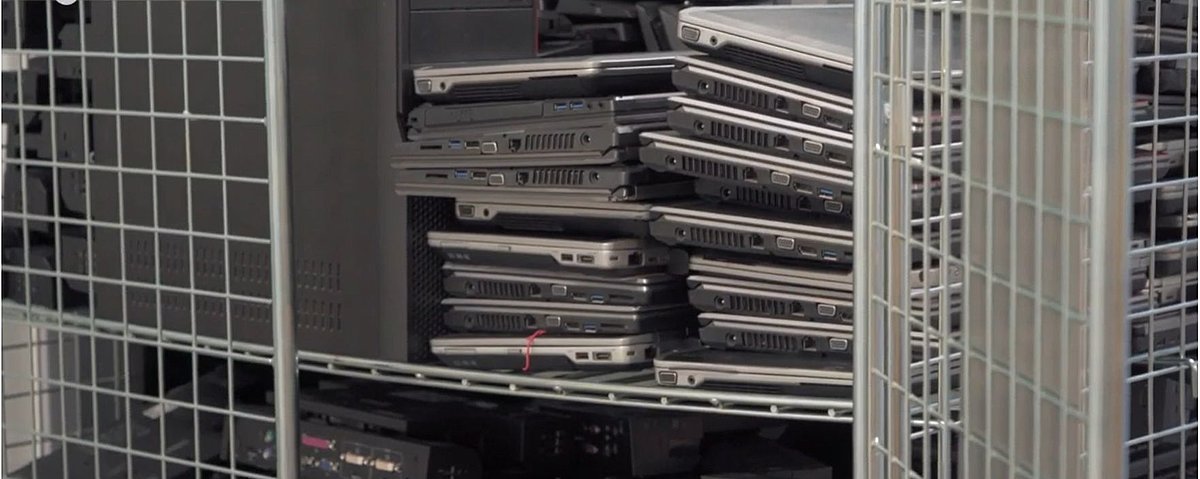Further reducing our consumption of resources
Saving drinking water, reducing paper consumption, avoiding waste
In addition to energy there are other resources that we use in our work and that we want to protect. To ensure that we always have a clear overview, resource consumption is part of our materiality analysis. We continually strive to conserve resources, focusing in particular on water, paper and waste. We explain our strategy in the section Environmental management at GIZ.
GIZ had set itself the goal of reducing per capita water consumption in Germany by 2 per cent in 2020. As a result of the COVID-19 pandemic, consumption in 2020 was 34 per cent lower than in 2019. Per capita consumption in fact dropped by 40 per cent compared with 2019 and stood at 5,574 litres per employee in 2020. The COVID-19 pandemic makes comparisons with previous years more difficult however, which in turn makes it difficult for us to gauge the success of the steps we have taken to foster sustainability.
In many of our partner countries, water is a particularly scarce asset that requires special protection. In these countries we record only the consumption of tap water, not bottled drinking water. This is only included in the figures where water canisters replace tap water. The data available for water consumption has continued to improve over recent years. It is nevertheless particularly complex, and our figures are still incomplete, partly because GIZ offices either are not fitted with water meters, or because the meters were defective or imprecise. In African countries in particular (e.g. Ghana and Nigeria), wells are sometimes used as a source of water.
Nevertheless, the data we do have allows us to conclude the following: in 2020 water consumption outside Germany was 22 per cent lower than in 2019. Per capita consumption in 2020 was 25 per cent down on the 2019 figure, at 25,153 litres per employee. This reduction is not as impressive as the cuts we have achieved in the consumption of other resources, because the pandemic has resulted in more water being used for hygienic purposes.
Reducing paper consumption
Paper is an essential resource that we use every day in the office. While it is not always possible to dispense with paper entirely, we have significantly reduced paper consumption worldwide since 2017 and are constantly working to reduce it further. By 2025 the volume of paper used for printing in Germany is to be cut by 30 per cent, while a target of 40 per cent has been set for outside Germany.
In 2020, all of the paper we used in Germany was recycled paper with the Blue Angel seal of approval. We also have low-energy printers. Our service provider uses our empty ink and toner cartridges to manufacture new ones.
In partner countries it is not always possible to use recycled paper as we do in Germany, as it is often difficult or even impossible to purchase it locally. Nevertheless, 10 countries in Africa, Asia and Europe have switched to 100 per cent recycled paper. In 2020, recycled and environmental paper accounted for 30 per cent more of our paper consumption than in 2019. To further reduce paper consumption in future, GIZ aims to make greater use of software applications. The pandemic has accelerated this shift.
Avoiding waste: recycling and reuse instead of disposal
We aim to generate as little waste as possible and to achieve a high level of reuse. Since 2013, a public-benefit IT service provider has been reprocessing our discarded IT equipment and subsequently marketing it as used equipment. Defective devices are disposed of in an environmentally friendly and professional manner.
During the procurement process too, we ensure that product packaging generates as little waste as possible, which is why we prefer reusable packaging. All packaging must meet our environmental requirements or be taken back by the supplier. We attach great importance to the repairability of purchased goods. There are collection bins for recycling used highlighters and markers at all our locations in Germany, especially at our training centres.
In 2020, GIZ produced a new waste strategy for locations in Germany, further simplifying and centralising the clear separation of waste. It focuses on easier separation of reusable materials, reducing the use of plastic, and more efficient cleaning. The total volume of non-hazardous waste generated in Germany stood at 115 kg per employee in 2020. The volume of non-hazardous waste was thus some 35 per cent lower than in 2019. A much smaller volume of hazardous waste is generated, with a total of about 15 tonnes. This includes defective electronic devices, batteries and light bulbs.
The Corporate Sustainability Handprint® (CSH) does not record waste, so no data is available from outside Germany. Nevertheless, we also conduct sustainability activities in this area. In GIZ’s Cairo Office in Egypt, waste is not only separated, but passed on to a non-governmental organisation (NGO) for upcycling. It manufactures products which are then sold, and the revenue is used to improve the situation of the local community.
Information on the following sustainability standards can be found on this page:
GRI standard 301, 303, 306

